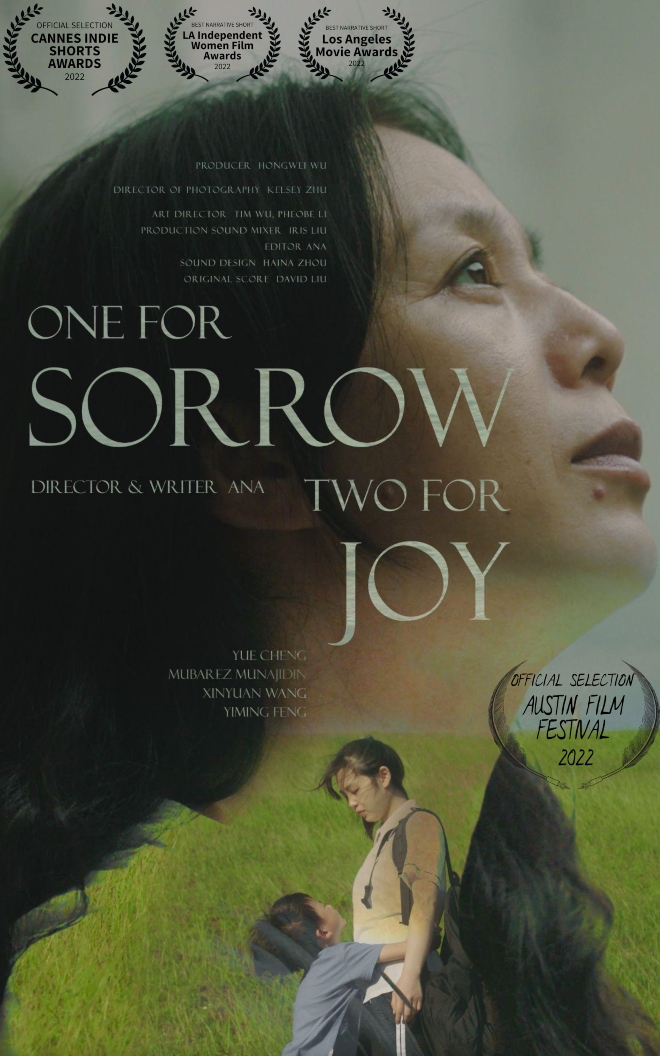Ana Yang and Hongwei Wu discuss their short film, One for Sorrow, Two for Joy, which won Best Narrative Short at Austin Film Festival.

By Elle Bent, Photo courtesy of Ana Yang
Under constant humidity and rain in the Southernmost region of China sits a port city, Guangzhou, in the Canton province. It’s here that a filmmaking force to be reckoned with, Ana Yang and Hongwei Wu, begin their story. The two are a steadfast team that balance each other. Yang describes herself as intuitive and creative, while Wu is diligent and hardworking.
The two women attended the Austin Film Festival (AFF), where their short film One for Sorrow, Two for Joy screened during the “In this Together” program. The film won Best Narrative Short, a well-deserved win for the up-and-coming filmmakers in their careers in the film industry.
For Sorrow
One for Sorrow, Two for Joy takes place after the second-child policy passes in China. The film follows 16-year-old Yimeng (Yue Cheng). She struggles to adjust when her 48-year-old mother (Xinyuan Wang) becomes pregnant with a boy to pass on the family line.
“The issue of gender has always been very personal to me,” writer and director Yang explains. “As the one-child policy ended, a lot of family and friends around me started getting pregnant at a high age. So, this [film]is a story of women and the deep-rooted sexism in societies. It tells the story of a girl and her mom behind this grand narrative.”
In just under 20 minutes, Yang and Wu accomplish so much in this film. The tale’s magical realism is filled with the intense emotions of a young girl grieving as the patriarchy takes from her. We see Yimeng in expansive settings: near the ocean, in a field, in a temple doorway. The world is large around her, reminding the audience of a concept that is much bigger than just a policy. Often, the unborn child, whom Yimeng refers to as a “parasite” in her mother’s body, invades the space.
“The policy is not the premise of the story,” says producer Wu. “It’s not something I want to emphasize too much. The policy changes, but there are many other factors impacting the freedom of women and their bodies. Maybe it’s their own way of thinking, culture, traditions or pressures from family. We’re trying to inspire our audience to think about just what body autonomy means.”
The Meaning of Water
Both Yang and Wu were born and raised in Guangzhou and came to the United States to study film at New York University and Columbia, respectively. One for Sorrow, Two for Joy is shot in Guangzhou, with ocean access and a subtropical climate.
“Visually speaking, I knew going into this film I wanted it to be very wet, very liquid,” Yang explains. “It’s different if you shoot a film here in Austin or California in the valley. Not just because of the landscape. It’s the people and the culture there. Everything that shapes the city. [Guangzhou] is gentle and tender. It’s humid and warm. That’s what I want my story to be about–a coastal little village where the people there all know each other, and they’re very tethered down to their traditions.”
The authenticity of the story is its strength. Yang and Wu’s own experiences growing up in China help truly bring to light a story far too many women share. One for Sorrow, Two for Joy takes an intimate look at the deeper effects of a policy the whole world is familiar with but hasn’t taken the time to listen to. The short opens space for the audience to think about reproductive rights everywhere. What these freedoms truly mean to women.
“I’ve always believed the fate of women is a collective thing,” says Yang. “Women all around the world should be there for each other. We should really pay attention to the collective fate of us, because right now, reproductive rights are a big issue.”
Stories with Impact
Both filmmakers hope to continue to create more impactful content. One for Sorrow, Two for Joy was Yang’s thesis film for NYU; the writer/director has much more to accomplish in the world of film.
“Whatever the world gave to the lonely kids, when the lonely kids grow up, they’re gonna give it back,” says Yang. “And that’s what I’m trying to do. I’m trying to return the kindness, the companionship, the love I found in literature when I was a kid. To become a good director is really to become a good human,” she continues. “The power of cinema is that it moves souls.”
Wu hopes to continue producing film and television that tell stories she truly cares about to impact her audience. “I understand how important film and television can be in people’s lives,” says Wu. “Film can make their life a little bit better. We always say that in a story, you hope the character always has some change at the end. I hope that people in their real life after watching the story, there’s something that changes for them. I want to create content where I really believe in the story that’s being told so I can make a bit of change in people’s lives.”
One for Sorrow, Two for Joy is a must-see from AFF for audiences–and women–everywhere. Not only is the storytelling artistically brilliant, but the message behind it can speak universally across cultures. “I just really want to talk loudly for the girls who were forgotten,” says Yang. “It’s so important that women filmmakers are making films, and it’s so important that stories are told about women from women. It’s time for us to be in the film industry and to rise and be bold.”

